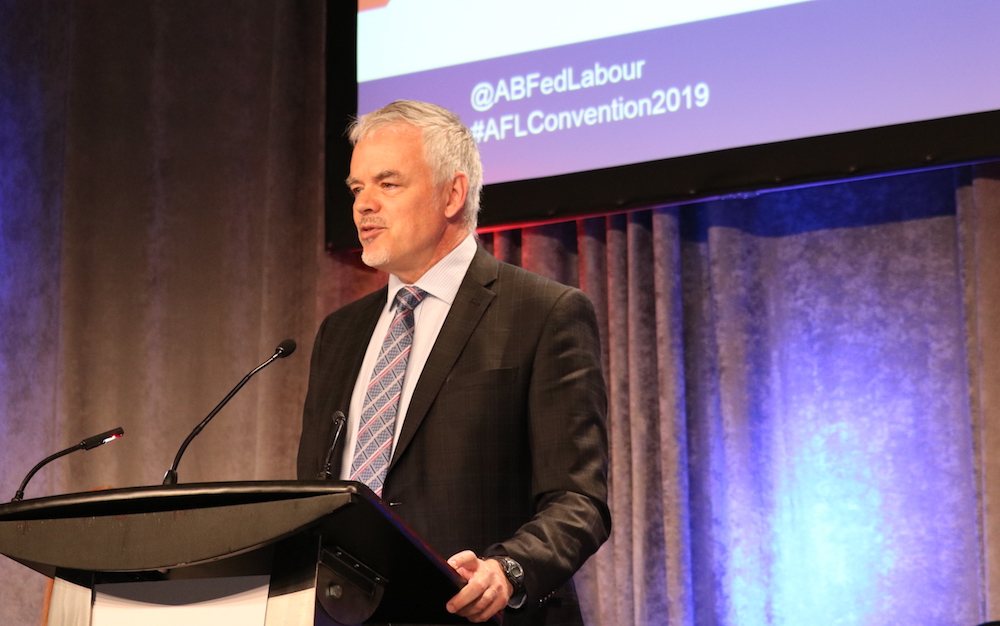What do Albertans imagine will happen if we manage to build more pipelines to tidewater, as the ocean is known out here on the Great Plains of North America?
Going into last April’s Alberta provincial election, there was a clear consensus by both Jason Kenney’s United Conservative Party and Rachel Notley’s then-governing NDP that more pipelines to get our ethical but disconcertingly fungible oil to additional markets was the answer to all our economic problems, real and imagined.
Which party was the best bet to get those pipelines built quickly became the election question for most of Alberta’s voters. Their answer on April 16 was resoundingly Kenney and the UCP.
It’s early days for the Kenney government, and whether we’re all going direct to heaven or direct the other way remains an open question. However, there are some things we can say about the premier’s promises, and his economic premises.
In his remarks to the Alberta Federation of Labour’s spring convention, Canadian economist Jim Stanford observed that there’s been so much hot air devoted to this issue that “no one has really critically and in a balanced way thought through, What does it actually mean to build more pipelines?“
Now a resident of Sydney, Australia, where he works for the Australia Institute’s Centre for the Future of Work, the former Globe and Mail economics columnist had some sharply worded thoughts on what happens when the “Klondike Gold Rush approach” to resource extraction moves in to an equally fevered export phase. As it turns out, Australia’s already been there, done that, and got the lousy T-shirt.
First some hard truths from the author of Economics for Everyone: As noted, oil is a fungible commodity — which means one barrel of oil is pretty much like every other barrel — so “to think that we can just get a much, much higher price by selling in Area A instead of Area B is absolute wishful thinking.”
What’s more, there’s that pesky law of supply and demand, which even Marxist economists agree is a thing. “If we in fact were successful in building enough pipelines to pump out millions of barrels more a day, we are clearly going to drive down the world oil price again,” Stanford observed. “So this knee-jerk idea that the market will reward us as long as we pump it out as fast as we possibly can is absolutely violated by the world’s history of this industry.”
And so the notion more pipelines will solve all our problems is, of course, nonsense.
“The cautionary tale I want to tell you is about the Australian LNG industry — liquefied natural gas,” Stanford continued, noting that Australians were following the same logic advanced by Kenney (and for that matter, Notley) when they looked at other markets and asked, “Why is all our gas stuck in Australia for $3 when we could be selling it in Japan for $10?”
So, abetted by right-wing governments and unhindered by even Canada’s lax regulations, “they went and built seven LNG export facilities all at the same time!”
“You want to see waste in action? Go and watch the LNG gold rush and oilsands gold rush in northern Alberta,” Stanford said. “That’s where you’ll see waste in action!”
“Anyways, guess what happened? They’ve got seven LNG export facilities. They’re pumpin’ it like there’s no tomorrow. Australia’s now the biggest LNG exporter in the world. …”
“So guess how much LNG sells for in Japan?” (Beat… beat … followed by a cry of “$3” from the audience.) “Three dollars! You got it. An economist in budding, right there!”
It’s that inconvenient supply-and-demand thing again. “And guess how much it sells for in Australia now? Five dollars! It sells in Australia for five fuckin’ dollars because all of the supply is leaving, and there’s no supply to meet the Australian market.”
So for Alberta’s pipeline pipedream, he continued, “it would not be as extreme but exactly the same logic, exactly the same flawed logic and undue faith in market mechanisms is behind the whole argument that all we have to do in Alberta is build more pipelines and pump it out even faster, and then we can reflate that great bubble.”
In other words, Stanford concluded his argument, “when Jason Kenney says I’m gonna come in and build the pipeline that no one else can build, and that will solve all our problems, he is Don Quixote of 2019, tilting at windmills. No doubt about it.”
Well, what does Stanford know, even if he did grow up in the midst of our bust-to-boom-and-back-again Alberta economy? He’s only a PhD economist with degrees from Cambridge University and the New School of Social Research in New York. The very definition of elitist!
Give him this much, though, he’s been around long enough to notice that “Canada and Australia have an economic similarity in that we have both been unduly dependent on the extraction and export of unprocessed resources. …”
And, what’s more, that “another similarity between Australia and Canada is each country has a remarkable proclivity to produce right-wing dickhead politicians.”
Now, if only Alberta could come up with a way to export them, we might be onto something!
Here endeth the lesson. This is the second of two pieces I promised about Dr. Stanford’s remarks. For those of you who want to dig a little deeper into this topic, though, a good quality video of Dr. Stanford’s keynote address has been posted by the AFL. Strong language and all. DJC
David Climenhaga, author of the Alberta Diary blog, is a journalist, author, journalism teacher, poet and trade union communicator who has worked in senior writing and editing positions with The Globe and Mail and the Calgary Herald. This post also appears on David Climenhaga’s blog, AlbertaPolitics.ca.
Photo: David J. Climenhaga



